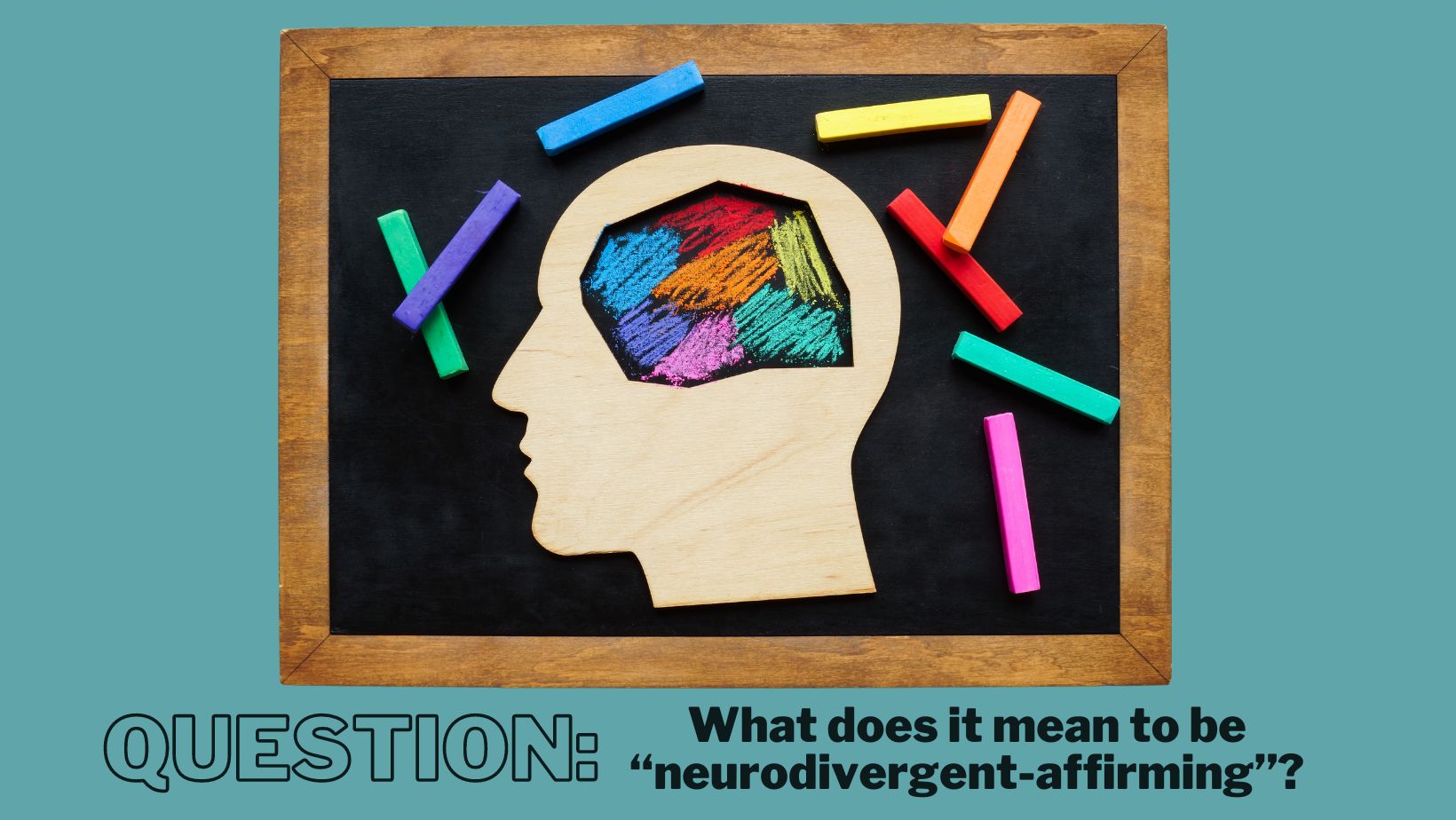
QUESTION: What does it mean to be “neurodivergent-affirming”?
Before delving into the broader question of what it means to be neurodivergent-affirming, let’s establish a foundation by defining the key terms. The concept of neurodiversity recognizes the multitude of ways people think, interpret information, and process the world. This encompasses diverse learning styles—auditory, visual, kinesthetic—varied thinking patterns- logical, systematic, empathetic- and a range of approaches to learning, such as project-based or textbook-oriented. For the purpose of this article, I will be specifically referring to autism.
Sometimes, the word neurodiversity is used synonymously with autism, but it is a much broader term than that. Neurodiversity encompasses ADHD, learning disabilities, anxiety, trauma, OCD, giftedness, intellectual delays and more.
Merriam-Webster defines “affirming” as “validate, confirm; to state positively; to show a strong belief or dedication to”.
Thus, neurodivergent-affirming means accepting, honoring, and respecting the various forms of neurodiversity without perceiving individuals as broken or in need of fixing. The core belief is that diverse brain differences are normal and do not necessarily indicate deficits. To be neurodivergent-affirming, the focus shifts to acknowledging strengths and identifying accommodations for individuals to flourish, moving away from concentrating on deficits.
Neurodivergent-affirming care, be it in school, a mental health facility or a social situation, operates within a social model of disability, viewing differences as a product of the environment rather than the individual. This approach contrasts with the traditional medical model, which seeks to “fix” individuals, while focusing on what they can’t do. An easy way to think about this is to consider the transformative impact of installing sidewalk ramps for wheelchair users, shifting the emphasis from altering the person (trying to get wheelchair uses to get around as “normal” people do to adapting the environment (adding in sidewalk ramps).
The importance of neurodivergent-affirming care and/or programming is that the individual learning styles, sensory, and accommodation needs of the person are put front and center. Neurodivergent-affirming service providers look at the strengths of each person and work toward further developing those, while building self-advocacy skills to help neurodivergent folks navigate through environments that are not designed to benefit them. For instance, sensory-friendly showings in movie theaters allow individuals to move, flap, or spin, creating an inclusive environment for those with sensory sensitivity.
Therapists, teachers, parents, and communities can adopt neurodivergent-affirming approaches by acknowledging the absence of a singular “neurotypical” brain- there is no right way to think, react or cope in various situations. Embracing and developing each person’s strengths fosters self-confidence and self-acceptance. Within a school setting, this may look like non-traditional seating arrangements, inclusion of a sensory-area, standing desks, rocking chairs, sensory-diet items (weighted vest, blankets, fidget items, noise-canceling headphones, soothing background music). Further, a focus on universal learning models, those that embrace and allow for students to demonstrate knowledge in their preferred modality, allows neurodivergent learners to thrive. For instance, at many of The Help Group schools, students can write an essay, draw a picture, perform a song, or create a diorama as a means of showing what they know and understand for a lesson, rather than all students being forced to demonstrate knowledge the same way. Students can access information in the way they learn it best, and therefore their learning differences are minimized.
It has been important to many neurodivergent folks seeking mental health (therapy) services that their therapist identify as neurodivergent-affirming. Neurodivergent-affirming therapists work collaboratively with clients to uncover strengths and foster self-advocacy. While supporting clients in changing behaviors or thoughts, the emphasis remains on self-acceptance, seeing the beauty in uniqueness and reducing self-blame. Therapy should focus on developing the skills and coping strategies the client needs to function most effectively within their environments. For example, as a neurodivergent-affirming therapist, I had an 18-year old client with an unusual “special interest” that he had had since he was a small child. The client had been told for years to “grow up” and to “stop perseverating on that.” When beginning therapy with me, we explored the client’s interest in depth and focused on how this client could find others who held the same interest. The client was eventually able to find several online chat groups and Facebook groups for those with a deep interest in the same thing. Instead of seeing his unique interest as a negative, we embraced it, allowing him to find friends for the first time. By affirming the client’s neurodivergence, we broadened his social circle and allowed him to remain his authentic self.
In essence, being neurodivergent-affirming is about creating an inclusive, understanding, and appreciative society that recognizes and values the diversity of neurocognitive experiences, allowing individuals of all neurotypes to thrive.
Have a question about our schools and programs?
Contact us at:admissions@thehelpgroup.org

Dr. Laurie Stephens is a developmental psychologist who has been working with children, teens, and young adults on the autism spectrum for over 30 years. She currently serves as The Help Group’s Senior Director of Autism & Clinical Programs. Previously, Dr. Stephens served as the Director of Clinical Services for Education Spectrum for 12 years. She provided diagnostic and psycho-educational evaluations, individual & family therapy, social skills training, educational consultation and professional, academic and parent training. Dr. Stephens has lectured around the world, focusing on social skills development and intervention strategies.
Dr. Stephens received her BA in Experimental Psychology from UC San Diego, and her Ph.D. in Developmental Psychology from SUNY Stony Brook. Prior to working with Education Spectrum, Dr. Stephens served for 8 years as the Director of Autism Spectrum Disorders Programs at The Help Group. In her position then, Dr. Stephens created Young Learners Preschool for Autism and designed comprehensive education, behavioral and social skills programs for all the specialized day schools. She established an intensive social skills summer camp program for children with Asperger’s Disorder, which had an international reach with campers coming from the United Kingdom, El Salvador, Japan, Korea, Mexico, the UAE and other countries.
Dr. Stephens’ primary area of specialty is in designing social skills curriculum, with a new-found passion for the changing nature of social expectations in the digital age. She has designed, run and supervised social skill groups for children as young as two years of age up through young adults. Dr. Stephens has focused much of her work on the development of theory of mind and how it relates to all aspects of a person’s functioning.
